The Prerequisite for Cuteness
| It’s been a while since I was in Japan. The last time I posted from Kawasaki, HAL-Con 2014 had not even begun— and in the weeks since elapsed, other, more imminent things have commanded my attention.But when I was there, man. Nothing commanded my attention in Japan more than Japan.
There were the public service announcements. There was Chiba City, which was not nearly so exotic as it seemed in Neuromancer. There was dinner with a US expat who told me interesting things about telecom’s whoring of its customer data to the US government. There was the store just outside the Tokyo subway station devoted to Snoopy memorabilia, and a Studio Ghibli store which, oddly, seemed to specialize in Moomin merch. There were the toilets, which really require a post— no, a research paper— all to themselves. There were these Vocaloid thingies, straight out of Idoru (or vice-versa: Idoru was explicitly lifted from the Vocaloid mindset, such as it was back in the nineties): synthetic performers who actually appear in concert to hordes of screaming fans and who can sing beyond the vocal range of mere meatsacks. (They also pimp Toyotas.) I did not meet Hatsune at the con— not even their awesome toilets had the requisite projection equipment— but that’s where my hosts filled me in on the details. There was the con itself, which was especially scary for me on account of a language gulf greater than any I’ve experienced in Europe. I nearly curled up into a whimpering ball when I got turned around during a solo excursion into Tokyo (using their subway network is like trying to navigate a mammalian circulatory system). (Although to give me credit, the guy I was meeting— who’s lived there on and off for over a decade— told me to meet him at “the exit”, apparently unaware that Tokyo Station has eight of those.) Fortunately my hosts took excellent care of me, and a couple of life-saving transplanted Europeans kept me up to speed. There was an audience Q&A. There was a freeform discussion between myself and Dr. Hideaki Sena— pharmacologist, best-selling SF author, and video-game inspiration— on the subject of consciousness and free will. There was a nifty little collection of some of my shorter works, illustrated by manga maestro (and fellow GoH) Hotaro Unno. As I may have mentioned in a previous post, seeing my angsty benthogothic rifters rendered as manga characters gave me a whole new perspective. More on that later. There was a bit of a rabbit-hole moment during an exchange with my Japanese editor after my reading of “The Eyes of God”, when I think some of the nuance contained in our respective views on God, animism, and the Orch-OR model of consciousness got lost in translation. For a few minutes there I thought I’d managed to give religious offense in one of the most secular nations on the planet, but apparently everything was cool. (Or at least, that’s what everyone tells me. Maybe they were just being polite.) But you know what the real highlight of the con was? The dead dog party afterward. It was held in this cozy little hole in the wall just around the corner from my hotel, down a couple of bright narrow streets that looked like they’d been lifted right out of Deus Ex. The place was called Pepperland, although I only glimpsed one or two bits of Beatles memorabilia in evidence. If there was any more, it must have been hidden behind the various models of Thunderbirds, Seaviews, Discoveries, and every goddamn iteration of the starship Enterprise ever committed to celluloid. The TV on the wall played an unending series of classic SF movies. Every centimeter of every shelf, every inch of wall space, was cheek-to-jowl with mementos of the best, the worst, and the ugliest that televised and cinematic SF has ever thought to offer up. Polite and formal guardians unwound on all sides; we quaffed beer and stuffed an endless variety of meaty kabobs down our gullets. And I learned something really interesting about Japanese heroines. They have to be cute. Apparently it’s kind of a prerequisite. And a prerequisite to cuteness, in turn, is peril. At least, this is how I understood it as the discussion unfolded. North American female protagonists are frequently strong, kick-ass, take-no prisoners. They can be tough and beautiful. Frequently all of the above. But cute? Show me a N’Am heroine who’s cute, Hotaro said. I thought of Buffy, at least during her first and second seasons. Sixteen-year-old cheerleader, kinda pouty; I guess you could call that cute. Certainly Willow was cute, prior to her black-eyed veiny-faced phase at least. But then, Willow was more sidekick than protag. Which leaves… So, Buffy? I suggested. Maybe there were others, but I don’t watch Bitten or Vampire Diaries or any of those other paranormal-romance cheese-fests. So I wouldn’t know. Didn’t matter. Nobody at the table had heard of Buffy Summers. Female protagonists in Japanese genre productions have to be cute, apparently. And cuteness is, I’m told, context-dependent. Big anime eyes and tiny pointed noses may be necessary but they are not sufficient. There must also be jeopardy. I have to admit this makes limited sense to me. I can understand the eroticism of the whole damsel-in-distress thing. Diana Rigg dragged all that into the mainstream half a century back; the producers of The Avengers couldn’t keep up with the demand for Emma Peel In Peril pics. But hot and cute are two different things, and the idea that the latter is a function not of an individual but of an interaction seems odd. What about Hatsune Miku, for example? She would seem to embody the very essence of Animé Cute, but unless that vegetable she keeps swinging around is going to give her food poisoning I don’t see any peril in her environment. But that’s just me, and I’m not Japanese. I pointed to Hotaro’s interpretation of Lenie Clarke regarding herself, icy-eyed, in the mirrored bulkheads of Beebe Station. “Not cute.” I pointed to his rendering of Lenie exposed and vulnerable, threatened by some hypertrophic monster from the deep sea. “Cute. Right?” “Right,” he said. But our long-suffering translator, worn to exhaustion, had thrown in the towel and gone off to enjoy herself. So that’s where we left it. I don’t think they were pulling my leg. Anyone have any insights on this? 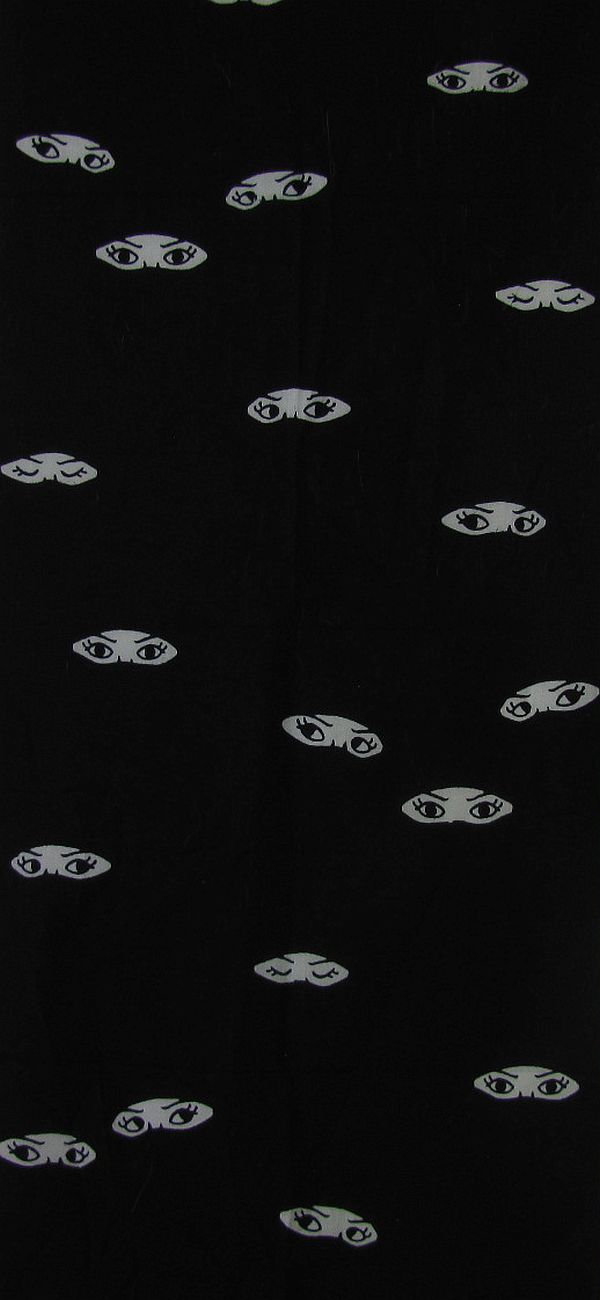 Tomoki gave me this cool hanging. At first I thought it was a bunch of moths. Actually they are Ninja Chicks. 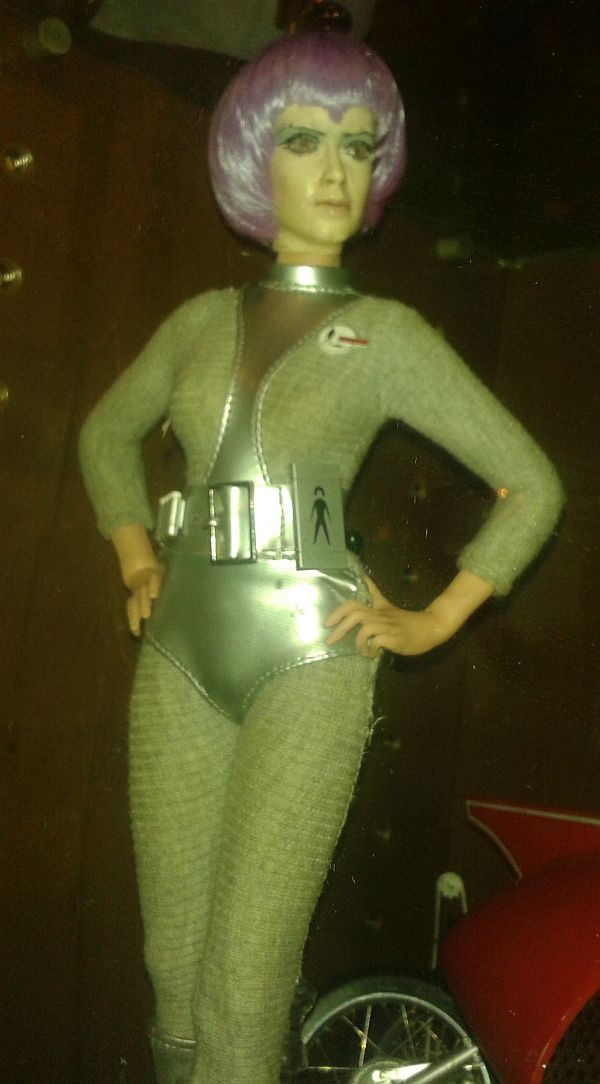 One of my many poseable fans. Either that or a Moonbase action figure from “UFO”. Which, like “Land of the Giants” I am alone in even remembering.
|
|
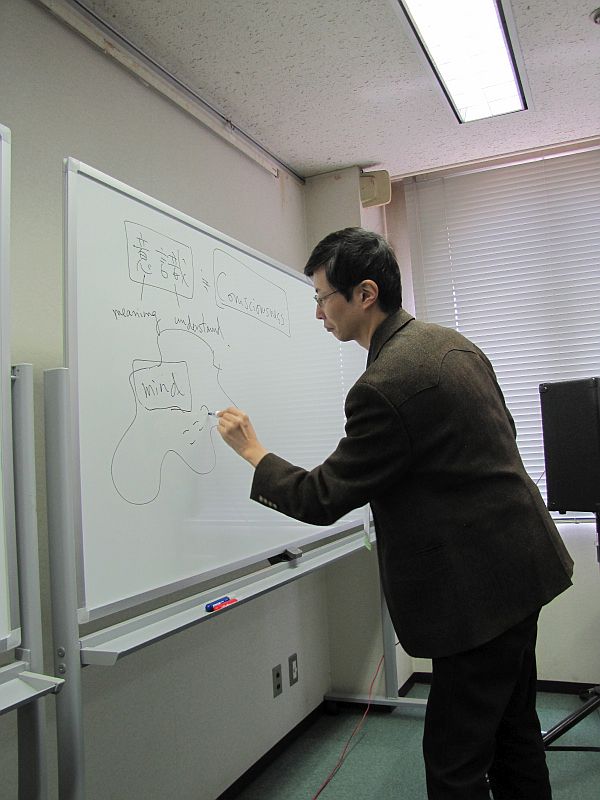
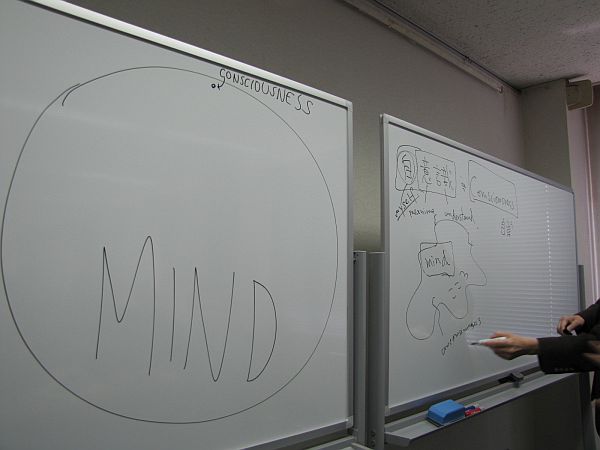

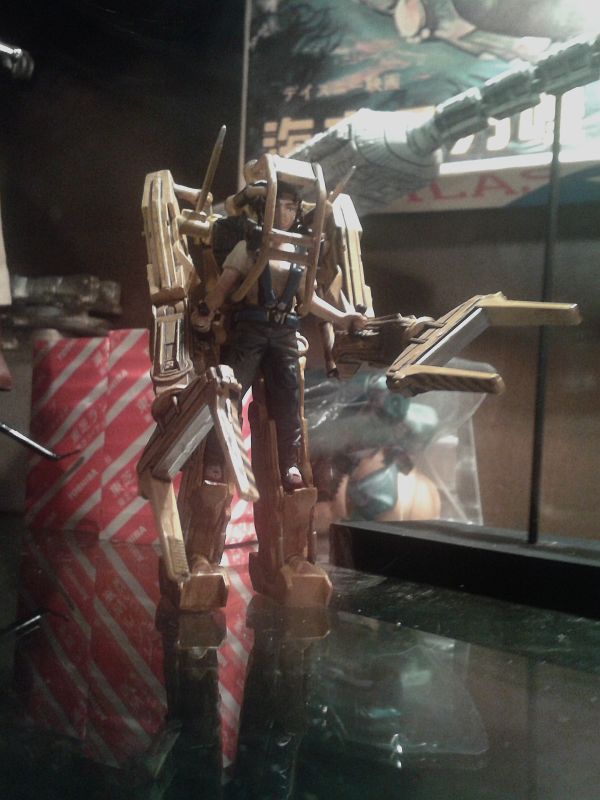
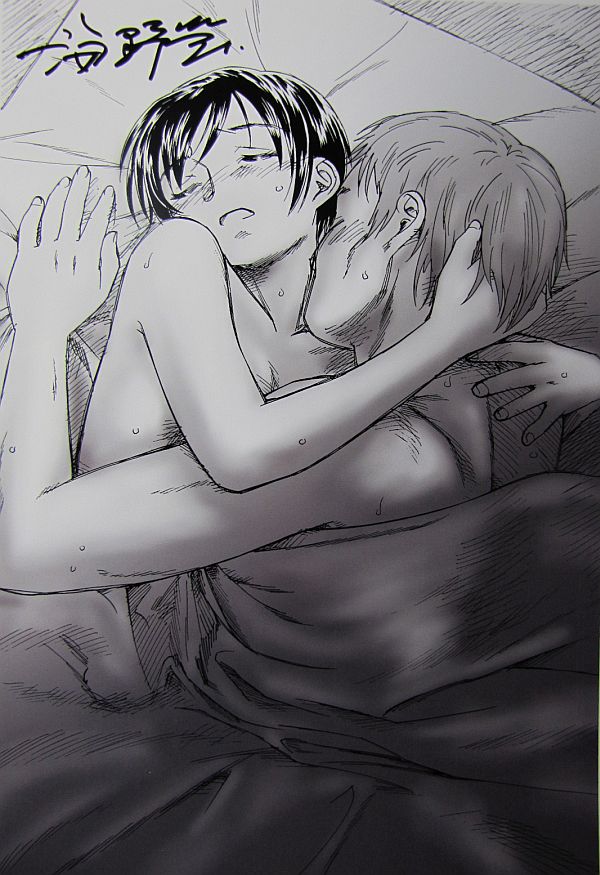
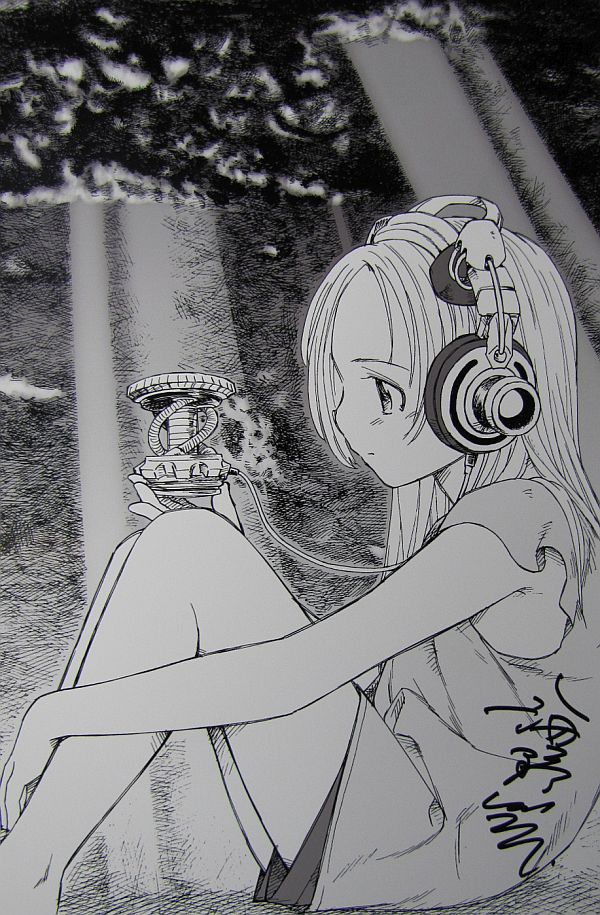
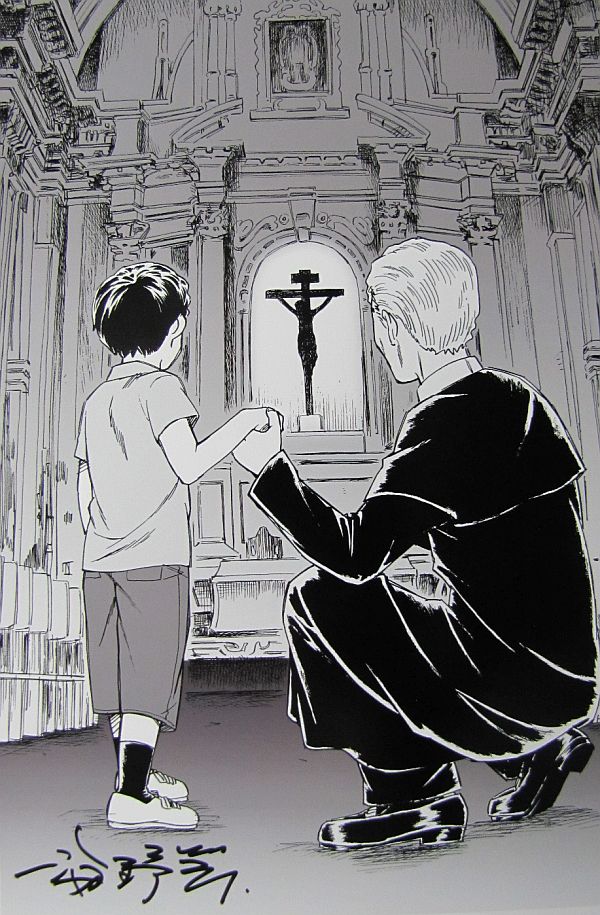
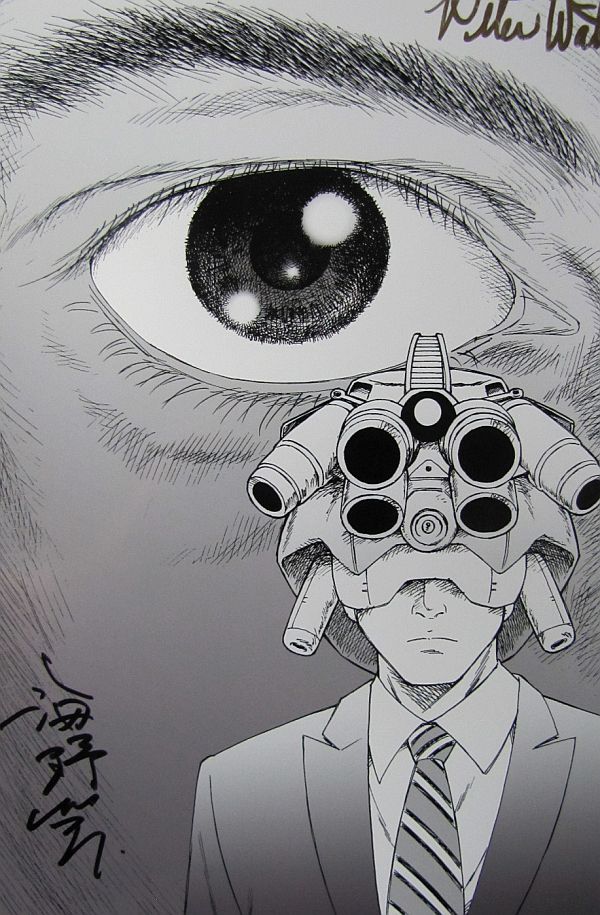



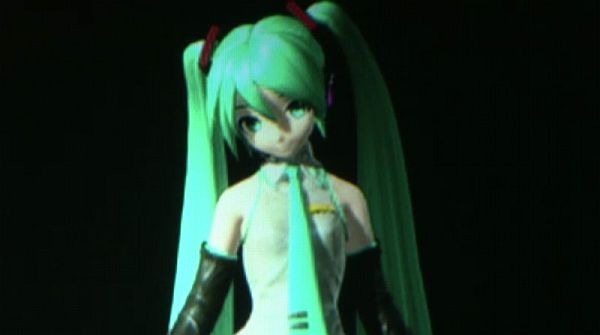
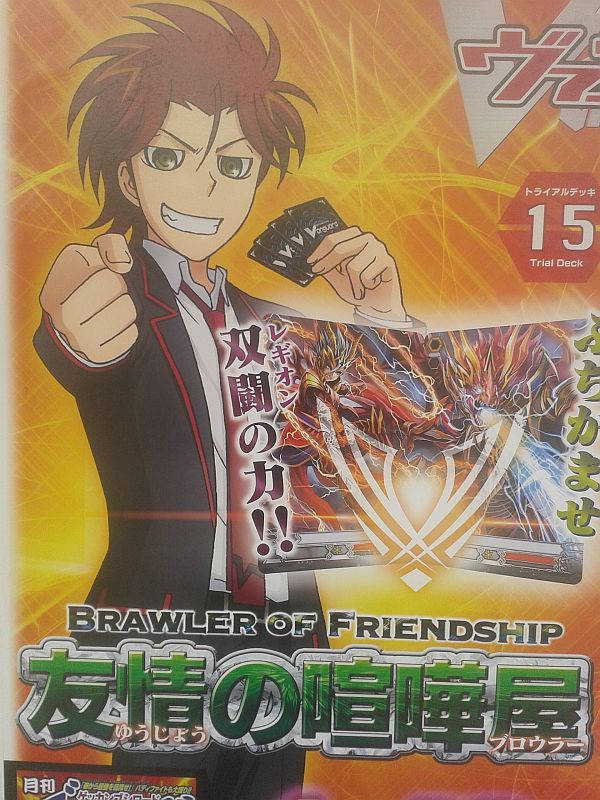


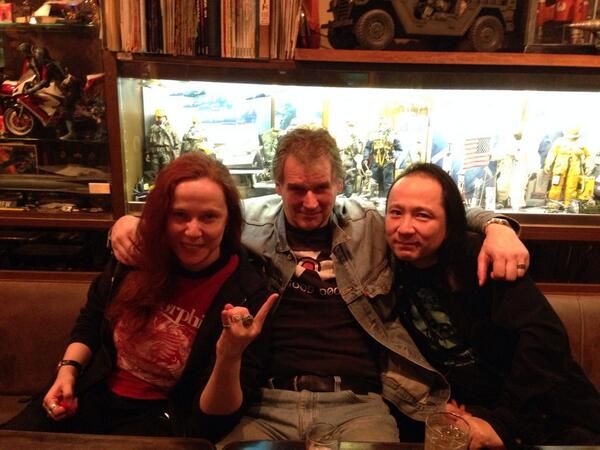
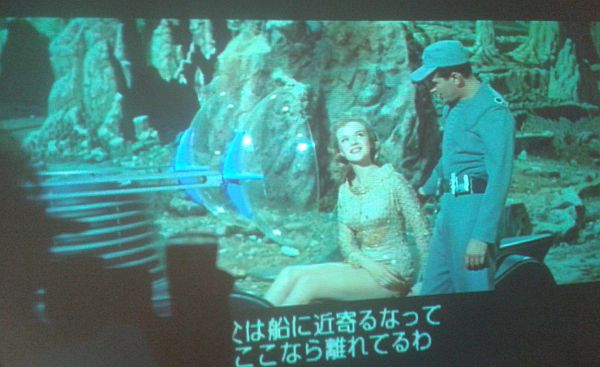
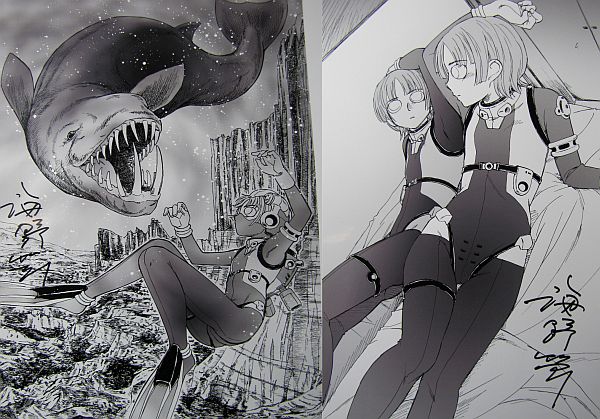
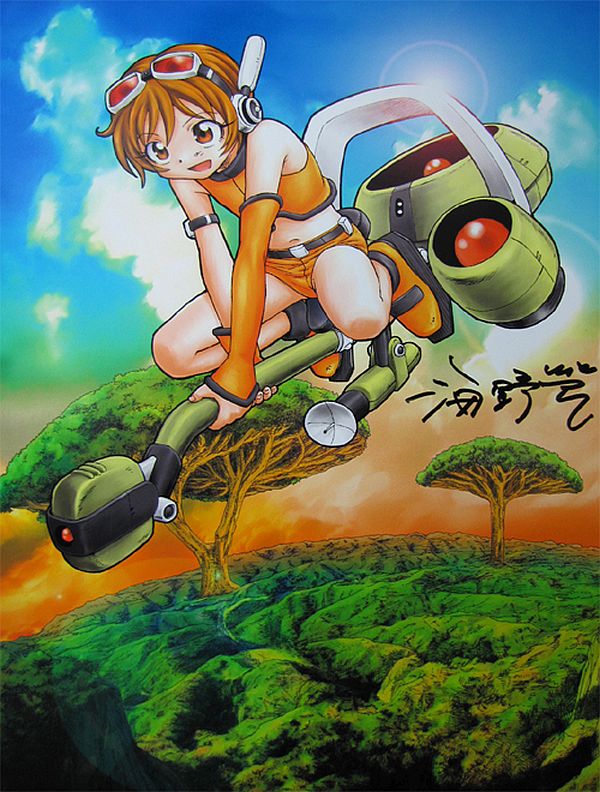
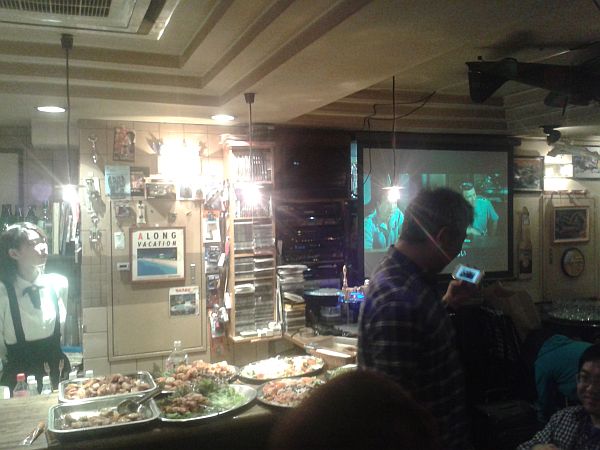
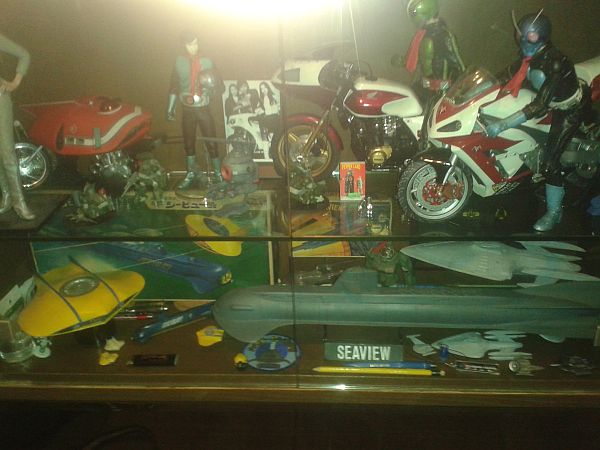


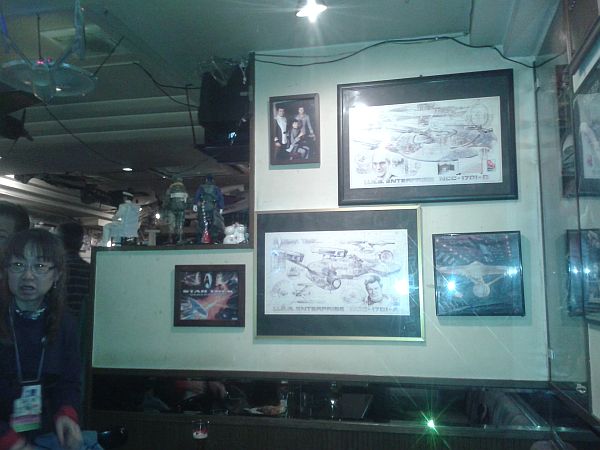

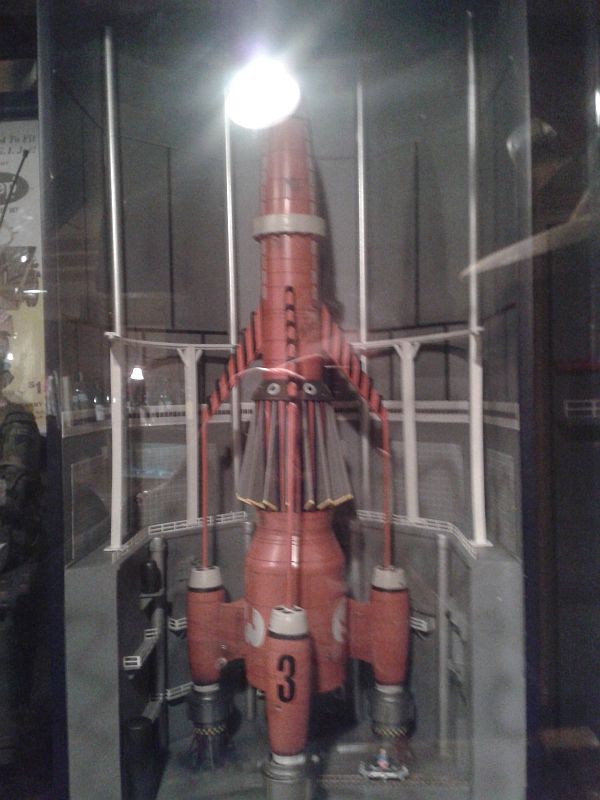
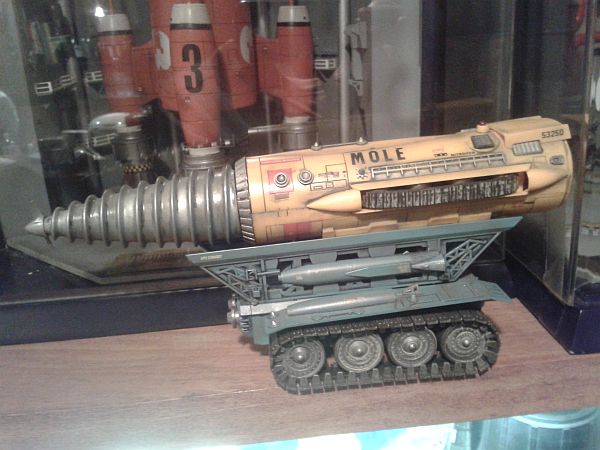

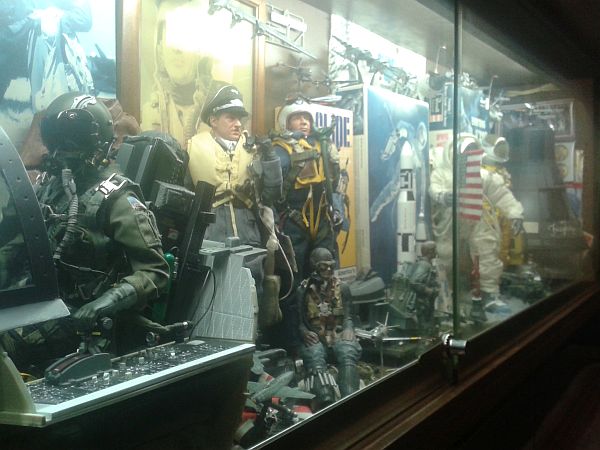
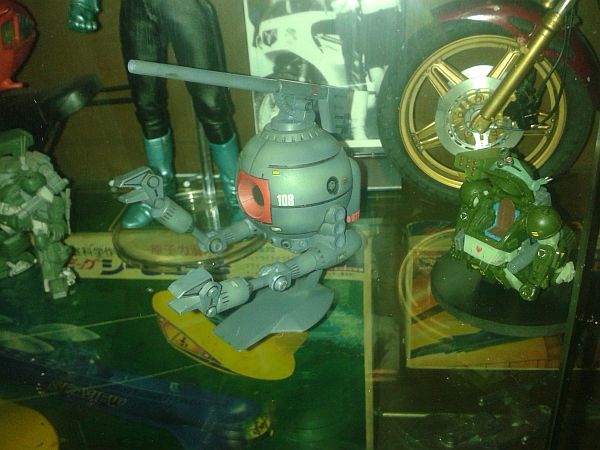








I love Japan and most everything they produce, but I’ve noticed they like to sometimes appear more intellectual by the simple expedient of being deliberately obscure or unnecessarily intrincate in their plots. And of course there’s the translation gap, as you have experienced.
I recall watching Neil Gaiman in Barcelona talk about an acquaintance of his whose hobby was feeding raptors meat off his manhood, and the interpreter lady’s brain just short circuited and said “and he just said something I’m not going to translate” so maybe that happened to you there at some point.
As for “cute” they were probably talking about this stuff
https://en.wikipedia.org/wiki/Kawaii
https://en.wikipedia.org/wiki/Moe_%28slang%29
The englsh word doesn’t really convey the whole…everything.
Are we aiming for manga adaptations of your works? Please say we are… please!
If this sells we might even see anime adaptations. Holy hell! Just think of Mamoru Oshii directing your art!
Huh? What’s your policy on having your stuff adapted to comics, anyway?
If it had miniatures in it, odds are always good that there’s a JP model or garage kit of it somewhere(the “unknown” is a Ball from Gundam; basically a workpod from 2001 with a tank gun bolted on).
Themed bars are a dime-a-dozen in Tokyo: a buddy of mine just got back from a collecting trip, with a selfie of himself at the Thunderbirds Cafe in Jimbocho.
( http://kotaku.com/5946503/japan-has-a-thunderbirds-cafe-and-its-freakin-amazing/ )
The missing phrase from the “have to be cute” line is “..or else it won’t sell”. There are still hot and tough female protagonists(especially in the comics), but the mainstream animation and merchandising business models are in a positive feedback loop with the shut-in hardcore fans.
I remember both Land of the Giants, and UFO, but only a little, I was a young lad in the 60’s.. Something about being attacked by giant spiders in the giant house’s heating vents left a deep impression!
Wasn’t UFO one of those British made TV series with gull wing cars etc?
The follow on being Space 1999 I think?
I really do wonder how much Shinto has influenced the Japanese acceptance and interest in technology.
Was there also “Stingray”?
Joe-90? Supercar? Space Patrol – The 1962 UK series? Captain Scarlet?
Land of the Giant, Space 1999 and UFO. Fun memories a wellspent youth.
Sheesh. Not only do you make an appearance in Japan shortly AFTER I’ve left (after 15 years of living there) but then twist the knife by posting pictures of you hanging out with people I know! (No, Regina, I don’t really hate you. Much.)
I’ve devoted many pages of text to the Japanese obsession with the cute, although mostly in reference to contemporary art rather than manga/anime. But of course the two occasionally overlap. I’m not even sure I want to get started on it, because it’s one of my personal bugbears.
I’m curious about this notion of “jeopardy,” because it seems unfamiliar to me. I am tempted to wonder if what they were aiming for was something closer to “vulnerability.”
That sense that a heroine needs to be cute is absolutely true (as a generality, of course. There are always exceptions.) There are heroines that can be completely kick-ass while fighting, or incredibly intelligent while solving a crime. And that’s all well and good, as long as they completely fall apart when it comes to issues of love or personal relationships. There needs to be that sense of vulnerability, that she’s really just a regular, shy, insecure girl at heart. Because no self-respecting otaku likes a tough girl who knows what she wants.
It’s not problematic for me to have a female character who is a bad-ass soldier but uncertain about her love life — that would be fine. The problem is that “cute,” in a Japanese context, essentially means “needs rescuing,” not necessarily from monsters or robots, but from her insecurities or her lack of experience in love/social affairs. So perhaps that’s the idea they were trying to get across to you.
Vulnerability is fine with me, but when it swings over into helplessness it seems to make the fanboys happy, and make me want to throw up in my mouth. We can chalk that up to cultural difference, but it’s still a cultural tendency to demand that women be innocent and childlike in order to be liked, even when they’re battling killer aliens.
As to the Lenie Clarke comparison, perhaps vulnerability or helplessness stretches across to literal peril as well. An instance of the more universal “rescue the princess” urge, maybe? Whatever activates a fan’s warm-fuzzy protective instinct, I suppose. Which again, leads us back to cute being something akin to childlike and unthreatening, as opposed to “beautiful,” which always carries an undercurrent of power.
That’s my ten-minute take, anyway.
I give up. What’s the film? (I recognised Forbidden Planet but not the still in background of your translator’s picture.)
Thanks, OS, for the cultural context info. Very interesting!
Anthony Cunningham,
The first Trek movie? Looks like Shatner and I’d guess that’s a bit of Vger in the background.
FraKKT,
geek answer syndrome:
The stuff in the backlist is Attribution-NonCommercial-ShareAlike 2.5.
For manga adaptions everyone would need to lawyer-up to work out different permissions due to the NC clause. Or I might have that wrong. But it is something I heard about when I saw play based on Little Brother by Cory Doctorow.
(I would love to see a manga based on Rifters, but not if Lenie gets disempowered and needed rescuing in this cute way. rescue by head cheese, that’s cool. how about that cute head cheese.)
(The opening bits where the prospect who burns out while Lenie succeeds — that character could be kawai.)
That’s what i understood, Sheila, but I sort of wanted to hear it from the Squid himself. I just might try my hand at a few scenes, even though I don’t do manga exactly.
OS,
Thanks, that seems to put to words something that has irked me in just about every recent anime series i have tried to watch.
For the nostalgia : UFO episodes can be seen on you toobs . They are as cheesy now as they were back then.:) BUT When you mentioned Captain Scarlett i just had to mention the new Captain Scarlet series , there’s at least two 13 episode seasons. I watched them all ,. Anderson has outdone himself .
I highly recommend watching his new adventures. They are not for kids . They are intended for an adult audience because of the stories. It’s just tackling with mass murder , viruses and stuff that would make any kid want to go to bed.
Virus , The Best of Enemies , the stories by themselves are fantastic.
Happy watching 🙂
Ric aka FuzzyTheBear